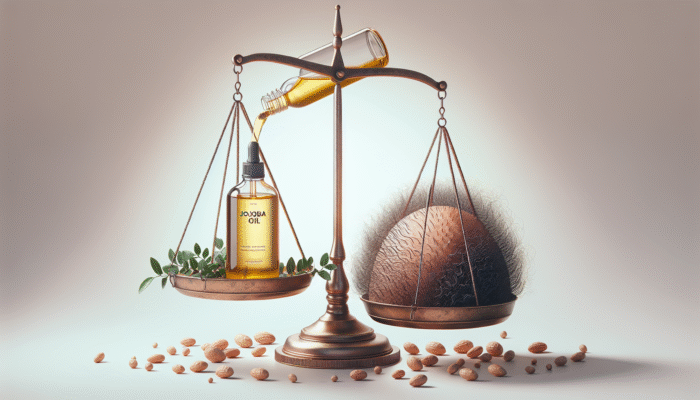Uncover the Remarkable Benefits of Essential Hair Oils for Thriving in the UK Climate
For those aiming for luxurious, healthy hair, hair oils have become essential allies, particularly in light of the unpredictable UK climate. Incorporating these oils into your hair care regimen not only offers a plethora of advantages, including enhanced nourishment and superior moisture retention, but also markedly improves <a href="https://limitsofstrategy.com/scalp-massager-effectively-your-ultimate-guide/">scalp health</a>. By recognising and utilising these benefits, you can elevate your hair from dull and lifeless to vibrant and resilient, enabling it to effectively adapt to any external environmental challenges that may arise.
Experience Profound Nourishment for Beautiful Hair

The true power of hair oil lies in its ability to provide deep nourishment, serving as a reparative treatment for damaged strands. Many individuals suffer from hair damage caused by environmental stressors, excessive heat styling, and harsh chemical treatments, leading to dry and brittle locks. By incorporating oils such as coconut or argan oil into your hair care routine, you can infuse your strands with vital nutrients that penetrate deeply into the hair shaft. These oils are rich in fatty acids, vitamins, and antioxidants that not only repair but also strengthen your hair from within, ensuring it remains healthy and resilient.
Research on the effects of coconut oil on hair has demonstrated its remarkable capacity to significantly reduce protein loss in both damaged and healthy hair. This indicates that by regularly applying coconut oil, you can assist your hair in maintaining its structural integrity, particularly during the colder months when the UK climate tends to strip moisture from your tresses. Furthermore, oils abundant in vitamins like vitamin E, found in argan oil, can effectively mend split ends and enhance the overall vitality of your hair.
When selecting a hair oil, it’s essential to choose products that offer nourishing properties tailored to your unique hair type. For instance, heavier oils such as castor oil may be more suitable for coarser textures, whereas lighter oils are ideal for finer hair. Selecting the appropriate oil ensures that your hair receives the nourishment it craves without feeling weighed down or greasy, allowing you to enjoy beautiful, flowing locks.
Master Moisture Retention Techniques for Healthy Hair
In the UK, where weather patterns can change dramatically, moisture retention is a vital factor in maintaining healthy hair. Hair oils excel at sealing in moisture by forming a protective barrier that prevents dryness and brittleness. The secret to this moisture retention lies in the oil’s ability to seal the hair cuticle, minimising water loss and ensuring hydration remains locked within your hair.
Consider how cold, windy winters or humid summers can impact your hair's overall health. Cold air can draw out moisture, while high humidity can contribute to frizz and unruliness. Incorporating a high-quality hair oil into your daily routine can effectively combat these challenges. For instance, just a few drops of jojoba oil can mimic the natural oils produced by your scalp, offering lightweight hydration that won’t leave your hair looking greasy. This is especially beneficial during the colder months when your hair is particularly vulnerable to dryness.
Moreover, oils such as olive oil not only excel at sealing moisture but are also rich in squalene, which nourishes both hair and scalp. This unique quality makes olive oil an exceptional choice for those striving to maintain optimal moisture levels throughout the day. By incorporating these nourishing oils into your hair care routine, you can ensure that your locks remain hydrated, shiny, and resilient against environmental elements.
Enhance Scalp Health to Support Optimal Hair Growth
A healthy scalp is the foundation of healthy hair, and the consistent application of hair oils can significantly enhance your scalp's condition. Many individuals struggle with issues such as dandruff, itchiness, or inflammation, which can impede hair growth and create an unfavourable environment for your tresses. Oils that possess anti-inflammatory and antimicrobial properties can greatly alleviate these conditions, promoting a healthier scalp.
For instance, tea tree oil is celebrated for its antifungal properties, making it a sought-after choice for those battling dandruff or a flaky scalp. When diluted with a carrier oil like coconut oil, it can be applied directly to the scalp to soothe irritation and cultivate a healthier atmosphere for hair growth. Similarly, the nourishing properties of argan oil can moisturise the scalp, preventing flakiness and dryness often exacerbated by harsh weather conditions.
Understanding your scalp’s unique needs is essential; regular oil application can stimulate blood circulation, encouraging hair follicles to thrive. A well-nourished scalp not only bolsters hair growth but also enhances the overall health and vibrancy of your hair. This holistic approach to hair care ensures that your locks remain strong and beautiful, regardless of external influences.
Delve into the Diverse Range of Hair Oils Available

Not all hair oils are created equal; each variety possesses distinct benefits and properties tailored to different hair types and needs. As you navigate the extensive world of hair oils, understanding their unique qualities can help you identify the right one to address your specific requirements, particularly with regard to the unique challenges posed by the UK weather.
Coconut Oil: Your Ultimate Hydration Solution for Hair
Coconut oil is frequently hailed as a miracle product within the beauty industry, and rightfully so. Its remarkable ability to penetrate the hair shaft offers intense hydration while preventing protein loss, making it an outstanding choice for individuals with dry or damaged hair. The saturated fats in coconut oil enhance moisture retention, ensuring your hair remains hydrated even in the most challenging weather conditions.
Incorporating coconut oil into your hair care routine is a straightforward process. It can be used as a pre-shampoo treatment, allowing it to saturate your hair for at least 30 minutes before washing. This technique not only aids in deep conditioning but also protects your locks from the harsh effects of shampoo. Additionally, applying coconut oil as a leave-in conditioner can help tame frizz and impart a healthy shine, resulting in a lustrous appearance.
However, it is crucial to opt for virgin coconut oil for optimal results, as it retains the highest concentration of beneficial properties. This versatile oil can also be used to enhance scalp health, providing relief from dryness and irritation, making it a staple for anyone contending with the unpredictable UK weather.
Argan Oil: The Liquid Gold Your Hair Craves
Fondly referred to as ‘liquid gold’, argan oil is replete with vitamin E and essential fatty acids, making it an ideal choice for adding shine and managing frizz whilst keeping your hair feeling lightweight. Its non-greasy texture ensures it won’t weigh down your strands, making it suitable for various hair types, including fine hair that often struggles with heaviness.
The benefits of argan oil extend to its protective qualities against heat damage, making it an essential product for those who frequently employ styling tools. By applying a small amount of argan oil prior to styling, you can create a protective barrier against the damaging effects of heat while also promoting softness and smoothness.
Argan oil is particularly advantageous during the transition from winter to spring, when fluctuating temperatures can wreak havoc on your hair. Incorporating it into your regular hair care routine can help your locks adjust to these changes, ensuring they remain healthy and vibrant. For the best results, seek out pure, cold-pressed argan oil to harness its full potential.
Jojoba Oil: The Ideal Balancer for Your Hair

Mimicking the natural oils produced by our scalp, jojoba oil is a lightweight option that balances oil production while providing hydration. This makes it exceptionally beneficial for individuals with oily or combination hair types, as it can help regulate sebum levels without introducing excess grease.
Utilising jojoba oil can also promote a healthy scalp, reducing dandruff and irritation. Its gentle formula allows it to serve as a carrier oil for essential oils, enhancing the overall benefits of your hair care regimen. For example, blending jojoba oil with tea tree oil creates a potent treatment for those grappling with scalp issues.
In terms of application, a few drops of jojoba oil can be massaged into the scalp or applied to the ends of the hair to lock in moisture. This versatility makes it one of the essential hair oils for anyone striving to maintain healthy hair, particularly in the unpredictable UK weather.
Olive Oil: Nature’s Ultimate Remedy for Dull Hair
Rich in antioxidants and vitamins, olive oil serves as an excellent natural solution for dull and lifeless hair. Its nourishing properties foster hair growth while enhancing shine, making it a go-to choice for individuals seeking to revitalise their locks.
Additionally, olive oil is superb for deep conditioning treatments. When warmed slightly, it can be applied to the hair and left on for an extended period to deliver intense hydration. This is particularly beneficial during the colder months when your hair may be exposed to harsh winds and low humidity, leading to dryness and potential breakage.
Furthermore, the antimicrobial properties of olive oil can bolster scalp health, assisting in combating dandruff and inflammation. Regular usage can foster a healthier scalp environment, ultimately supporting hair growth and overall vitality. For those embracing natural hair care solutions, incorporating olive oil into your routine can yield remarkable results, especially when addressing the challenges posed by local weather conditions.
Your Guide to Selecting the Most Suitable Hair Oil
Choosing the right hair oil is crucial for achieving your desired results, particularly concerning your specific hair type and the effects of the UK weather. By considering factors such as hair type, intended benefits, ingredient quality, usage frequency, and budget, you can make an informed decision that aligns with your hair care goals.
Understanding Your Hair Type for Optimal Oil Selection
Your hair type is a fundamental aspect to consider when selecting the appropriate hair oil. Oily, dry, and normal hair each possess unique needs, and choosing an oil that complements your specific texture can significantly enhance your results. For instance, those with oily hair may find lighter oils like jojoba beneficial, as they can hydrate without adding excess grease. Conversely, thicker oils such as castor oil are ideal for dry or coarse hair, delivering the intensive nourishment required for optimal health.
It is essential to monitor how your hair reacts to various products. If you notice that your hair feels weighed down or greasy after using a particular oil, it may not be the right match. Experimenting with different oils and observing their effects can help you discover the perfect fit for your unique hair type, ensuring you enjoy the full benefits of your chosen product.
Additionally, consider seasonal changes in your hair’s needs. For instance, you might require a heavier oil during the winter months when moisture retention is crucial, while lighter oils may suffice in the summer when humidity levels rise. This thoughtful approach allows you to address your hair’s evolving requirements throughout the year.
Identifying Your Desired Benefits from Hair Oils
Understanding your objectives for using hair oil will help you select the most suitable option. Are you looking to hydrate, add shine, control frizz, or encourage hair growth? By pinpointing your primary goals, you can effectively narrow down your choices to the oils that will best meet your needs.
If hydration is your main concern, oils rich in fatty acids, such as coconut or argan oil, are excellent choices. For those seeking to tame frizz, a silicone-infused oil might provide the sleekness you desire while maintaining moisture. Furthermore, if hair growth is your goal, oils like castor oil are celebrated for their potential to stimulate hair follicles and encourage stronger, healthier growth.
It’s also advantageous to focus on oils that offer multiple benefits, allowing you to address a variety of concerns with a single product. This approach not only simplifies your hair care routine but also leads to more effective results over time.
Prioritising Ingredient Quality for Hair Oil Efficacy
The quality of ingredients in your chosen hair oil can significantly influence its effectiveness. Opting for products that contain high-quality, natural ingredients can ensure you achieve optimal results while minimising the risk of irritation or adverse reactions. Seek out unrefined oils, as they retain more nutrients and beneficial properties than their refined counterparts.
Reading labels and understanding ingredient lists is essential. Avoid products laden with synthetic additives, preservatives, or artificial fragrances, as these can diminish the natural benefits of the oil and potentially harm your hair over time. Natural oils are more likely to provide the nourishment and moisture your hair requires, especially in challenging weather conditions.
Moreover, consider eco-friendly brands that prioritise sustainability and ethical sourcing. Supporting companies that align with your values not only promotes healthier hair but also contributes positively to the planet, making your hair care routine more conscientious.
Determining Usage Frequency for Effective Results
Deciding how frequently you plan to use hair oil can influence your choice. Some oils are designed for daily use, while others may be more suitable for weekly treatments. For example, lighter oils like jojoba can be used daily without feeling heavy, while richer oils like olive oil might be best reserved for occasional deep-conditioning sessions to restore moisture.
Aligning your hair oil application frequency with your hair care routine can yield better results. If you find yourself in a more humid environment, for instance, using a lightweight oil daily can help combat excess moisture and frizz. Conversely, if you are experiencing a particularly dry season, a heavier oil applied weekly may bolster your hair’s resilience against environmental stressors.
Consistency is key when using hair oils. Regular application can lead to improved hair health over time, making it essential to establish a routine that seamlessly fits into your lifestyle, ensuring your hair remains vibrant and manageable.
Balancing Budget with Quality Hair Oils
Hair oils can vary significantly in price, so setting a budget before you shop can help narrow down your options. While premium oils may offer superior benefits, there are also many affordable options that deliver excellent results. Look for products that provide value without compromising on quality, allowing you to achieve beautiful hair without overspending.
Consider purchasing smaller sizes or trial versions of oils to evaluate their suitability before committing to larger bottles. This can be particularly helpful when exploring new brands or formulations. Additionally, keep an eye out for sales, promotions, or discounts that can make high-quality products more accessible without straining your budget.
Investing in quality hair oils is a long-term commitment to your hair health. However, balancing this investment with your financial situation is crucial, ensuring you select products that align with your budget while still delivering on performance and results.
Perfecting the Application of Hair Oils for Maximum Benefits
The method you use to apply hair oil can greatly influence its effectiveness, ensuring you maximise the benefits of your chosen product. Different application techniques can target specific concerns, enhancing the advantages of must-have hair oils for UK weather and ensuring that your hair receives the nourishment it requires.
Effective Pre-Shampoo Treatments for Healthier Hair
Applying oil to dry hair before washing can serve as an excellent pre-shampoo treatment, providing deep conditioning that protects your locks from the drying effects of shampoo. This method has gained popularity due to its ability to allow the oil to penetrate the hair shaft thoroughly, delivering nourishment before the cleansing process begins.
To perform a pre-shampoo treatment, begin by warming the chosen oil slightly, which enhances its penetration ability. Massage the oil into your hair, focusing on the mid-lengths and ends, where damage typically occurs. Allow the oil to sit for at least 30 minutes—or longer if time permits—before shampooing as usual. This technique can significantly reduce hair breakage and maintain moisture levels, particularly in harsh UK weather conditions.
Moreover, this method can be customised to meet your specific needs. For example, if your hair is particularly dry or damaged, consider using a heavier oil like coconut or castor oil for a more intensive treatment. Conversely, lighter oils can be employed for routine maintenance, ensuring your hair remains healthy and vibrant.
Utilising Hair Oils as Leave-In Conditioners for Daily Hydration
Using hair oils as leave-in conditioners can transform your hair care routine, offering ongoing moisture and shine throughout the day. This technique is especially beneficial for individuals with dry or frizzy hair, as it helps to tame unruly strands and maintain a polished appearance.
To apply, start with a small amount of oil—typically, a few drops are sufficient. Rub the oil between your palms and distribute it evenly through the mid-lengths and ends of your hair, avoiding the roots to prevent greasiness. This method is particularly effective during the UK summer months when humidity can lead to frizz and flyaways, ensuring your hair remains manageable and radiant.
For enhanced benefits, consider blending different oils for a customised approach. For instance, combining argan oil for added shine with jojoba oil for moisture can create a balanced leave-in treatment that addresses multiple concerns. This technique not only protects your hair against environmental stressors but also ensures it remains vibrant and healthy throughout the day.
Overnight Treatments for Intensive Hair Repair
Applying hair oil as an overnight treatment can deliver intensive hydration, allowing the oil to work its magic while you sleep. This method is particularly effective for individuals with extremely dry or damaged hair, providing deep nourishment that can lead to noticeable improvements by morning.
To perform an overnight treatment, apply a generous amount of oil to the ends of your hair and gently work it up towards the mid-lengths. Avoid applying oil near the scalp unless it is particularly dry, as this may lead to greasiness. Once applied, cover your hair with a silk or satin scarf to prevent the oil from transferring onto your pillow and help your hair retain moisture throughout the night.
In the morning, thoroughly wash your hair to remove any excess oil, and enjoy the benefits of your overnight treatment. This technique is especially advantageous during winter months when hair is prone to dryness due to indoor heating and cold weather. By incorporating overnight oil treatments into your routine, you can achieve soft, manageable hair that withstands the challenges of the UK climate.
Avoiding Common Hair Oil Mistakes for Optimal Results
Even the most experienced hair care enthusiasts can fall victim to common mistakes when using hair oils. By understanding these pitfalls, you can maximise the benefits of must-have hair oils for UK weather and ensure your hair receives the care it truly deserves.
Preventing Overuse of Hair Oils for Better Results
One of the most prevalent mistakes is applying excessive oil, which can result in greasy-looking hair that lacks volume and bounce. Hair oils are potent, and a little goes a long way. Understanding the appropriate amount for your hair type is crucial for achieving the desired results without weighing your hair down.
For most hair types, starting with just a few drops is advisable. If you find that your hair still feels dry after application, gradually increase the amount until you achieve the right balance. Remember, you can always add more, but removing excess oil can be quite challenging, leading to frustration and potential damage.
Overuse can also result in product buildup on the scalp, hindering hair growth and exacerbating conditions like dandruff. Therefore, it’s vital to focus on moderation and consistency. Regular use of a clarifying shampoo can help eliminate any buildup that occurs over time, ensuring your hair remains healthy, clean, and vibrant.
Perfecting Application Techniques for Maximum Effectiveness
Where you apply the oil can significantly influence its effectiveness. Many individuals make the mistake of applying oil directly to the scalp, leading to an overly greasy appearance. Instead, concentrate on the mid-lengths and ends of your hair, where moisture and nourishment are most needed, while allowing the scalp to maintain its natural balance.
Carefully sectioning your hair can ensure even distribution. This technique allows the oil to penetrate the hair shaft effectively, improving hydration without overwhelming your scalp. If you wish to address scalp issues, consider using lighter oils or essential oils mixed with a carrier oil, ensuring you maintain balance and avoid excess oiliness.
Additionally, consider the timing of your application. Applying hair oil before a workout or outdoor activities can trap moisture and protect your hair from sweat and environmental elements, making it a proactive step in your hair care routine. Understanding the nuances of application can lead to improved results and healthier-looking hair.
Prioritising Scalp Health in Your Routine
While oils can benefit the scalp, many individuals neglect regular cleansing, leading to buildup and irritation. Maintaining a clean scalp is essential for supporting healthy hair growth and ensuring optimal results from your hair oil treatments. A well-cared-for scalp creates the perfect environment for healthy hair to thrive.
Incorporating a gentle exfoliating treatment into your routine can help eliminate dead skin cells and product buildup, fostering a healthier scalp environment. Additionally, ensure you’re using a shampoo that suits your hair type and doesn’t strip your scalp of its natural oils, allowing for a well-balanced approach to hair care.
Finding the right balance between oil application and scalp care is crucial. Regular cleansing, combined with targeted oil treatments, can enhance your scalp’s health, ultimately leading to stronger and more resilient hair as it adapts to the challenges of UK weather.
Maximising the Effectiveness of Your Hair Oils for Best Results
To achieve your desired results more effectively, it is essential to maximise the potential of your chosen hair oils. Simple techniques such as combining oils, pairing them with other products, and maintaining a consistent usage routine can significantly enhance your experience and results.
Exploring the Benefits of Mixing Hair Oils
Combining different hair oils allows you to leverage their combined benefits, creating a tailored treatment that caters to your specific needs. For example, mixing coconut oil with argan oil can provide deep hydration while adding shine and softness to your hair, optimising the overall health of your locks.
Experimenting with combinations can be particularly rewarding and fun. Consider your hair’s current condition and the benefits you wish to achieve. A blend of jojoba oil for lightweight hydration and castor oil for thickness can yield transformative results for those with fine or thinning hair, offering a comprehensive solution to your hair care challenges.
When combining oils, start with small ratios and adjust according to your preferences and needs. This DIY approach not only fosters creativity but also provides a more personalised solution to meet the unique challenges posed by UK weather, enhancing your overall hair care experience.
Pairing Hair Oils with Other Products for Enhanced Efficacy
Integrating hair oils with other hair care products can amplify their moisturising and protective properties. For example, using a hair oil alongside your usual conditioner can deliver an added boost of hydration, which is particularly beneficial during colder months when hair is more susceptible to dryness.
Consider applying hair oils immediately after washing, while your hair is still damp. This can help lock in moisture and provide an additional layer of protection against environmental stressors. Furthermore, using a serum or styling cream in conjunction with your chosen oil can offer extra hold and styling benefits, enhancing the versatility of your hair care routine.
Incorporating oil into your overall hair care regimen can create a synergistic effect that leads to healthier, shinier hair. This method ensures you are well-equipped to face any challenges presented by the ever-changing UK weather, allowing your hair to thrive in any condition.
Emphasising Regular Use for Long-Term Benefits
Consistency is vital when it comes to achieving optimal results with hair oils. Regular application can lead to healthier, more hydrated hair over time. Establishing a routine that includes hair oil treatments can make a significant difference in your hair’s overall condition, ensuring it remains vibrant and full of life.
Consider scheduling your oil treatments weekly or bi-weekly, depending on your hair type and needs. Keeping a hair care journal can assist in tracking which oils work best and how frequently you should apply them based on seasonal changes and personal observations. This reflective practice can enhance your understanding of your hair’s needs.
Regular use also allows you to assess how your hair responds to different products over time, providing valuable insights that can help refine your hair care routine. Adopting a consistent approach ensures that your locks remain resilient and adaptable, regardless of the challenges posed by local weather conditions.
Your Hair Oil Questions Answered: FAQs
What are the key advantages of using hair oils?
Hair oils offer deep nourishment, enhance moisture retention, and improve scalp health, promoting overall hair vitality and resilience against environmental factors.
How often should I apply hair oil?
The frequency of application depends on your hair type; lighter oils can be used daily, while heavier oils are better suited for weekly treatments to maintain balance.
Can I mix different types of hair oils?
Yes, combining oils can enhance their benefits, allowing you to tailor treatments to suit your hair's specific needs and conditions.
Is it necessary to wash my hair after using oil?
If using oil as a leave-in treatment, washing is not required. However, pre-shampoo treatments should be rinsed out for optimal results and to prevent buildup.
What type of hair oil is best for dry hair?
Oils like coconut and castor oil are excellent choices for dry hair, providing intensive hydration and essential nourishment to restore vitality.
Can hair oil help alleviate dandruff?
Yes, oils with antimicrobial properties, such as tea tree oil, can help alleviate dandruff and promote a healthier scalp environment for hair growth.
Should I apply oil to my scalp or just the ends of my hair?
Focus on mid-lengths and ends to avoid greasiness; however, lighter oils can be applied to the scalp if necessary for added hydration and balance.
Will using hair oil make my hair greasy?
Using the correct amount is crucial; too much oil can lead to greasiness. Start with a small amount and adjust as needed to find the right balance.
Can I apply hair oil on wet hair?
Yes, applying oil to damp hair can help lock in moisture and enhance hydration, providing added benefits in your hair care routine.
Are there any side effects associated with using hair oils?
While most natural oils are safe, some individuals may experience allergies or irritation. Always patch-test new products before full application to ensure compatibility.
Connect with us on Facebook for more tips and updates!
The Article: Must-Have Hair Oils for UK Weather: Essential Hydration appeared first on Amitys Hair Salon.
The Article Essential Hydration: Must-Have Hair Oils for UK Weather Was Found On https://limitsofstrategy.com


Your exploration of the benefits of essential hair oils within the context of the UK climate is both timely and relevant, particularly as we navigate the challenges of ever-changing weather conditions. I have personally experienced the transformative effects of hair oils, especially regarding moisture retention and scalp health, which can often be overlooked in mainstream hair care discussions. Living in an environment where humidity fluctuates drastically between seasons makes it paramount to adapt our hair care routines accordingly.
Your experience really highlights something many people seem to overlook in the hustle of daily life—how crucial it is to pay attention to our hair, especially in a climate that can’t decide if it’s summer or a monsoon. I mean, one minute you’ve got a luscious mane straight out of a shampoo commercial, and the next you’re battling a frizz monster straight out of a horror movie.
“I’m so glad to hear that you’ve experienced the transformative power of hair oils! To further enhance your routine and explore more about how essential oils can benefit your hair in varying climates, check out this helpful guide [insert link].”
https://littletonauction.com/FaceTune